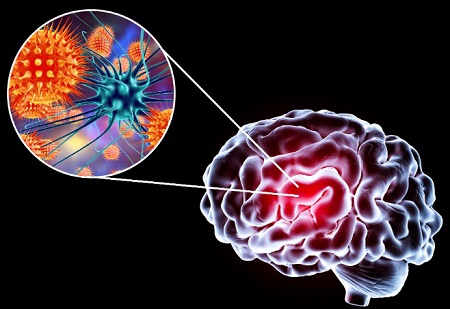Nikhil Prasad Fact checked by:Thailand Medical News Team Jun 11, 2024 1 year, 6 months, 1 week, 3 days, 16 hours, 12 minutes ago
Medical News: The Herpes Simplex Virus type 1 (HSV-1) is a neurotropic virus that has been associated with various neurodegenerative disorders. Autophagy, a cellular process essential for maintaining homeostasis by degrading defective proteins and organelles, plays a critical role in the central nervous system (CNS). While much research has focused on the interaction between autophagy and HSV-1 in neurons, its effects on glial cells are less understood. This study by researchers from Universidad Autónoma de Madrid-Spain, Centro de Biología Molecular Severo Ochoa, CSIC-UAM-Spain and Instituto Cajal-CSIC, Madrid-Spain that is covered in this
Medical News report explores how HSV-1 inhibits autophagy in glial cells and the implications for viral replication and neurodegeneration.
 Herpes Virus Manipulates Autophagy in Brain Cells for Survival
The Role of Autophagy in the CNS
Herpes Virus Manipulates Autophagy in Brain Cells for Survival
The Role of Autophagy in the CNS
Autophagy is vital for the proper functioning and survival of CNS cells. It has been predominantly studied in neurons, where it helps prevent the accumulation of toxic proteins that can lead to neurodegenerative diseases. However, glial cells, which make up a significant portion of the brain's cellular composition, also rely on autophagy for their supportive functions.
In multiple sclerosis (MS), a neurodegenerative disorder characterized by inflammation, demyelination, and neurodegeneration, impaired autophagy in glial cells can contribute to disease progression. Oligodendrocytes, which myelinate axons in the CNS, and astrocytes, which support neuronal communication and repair CNS lesions, both rely on autophagy. Dysfunctional autophagy in these cells can lead to demyelination and exacerbation of MS symptoms.
HSV-1 and Neurodegenerative Disorders
HSV-1, after initial infection of epithelial cells, can travel to the trigeminal ganglia and establish lifelong latency. Occasionally, HSV-1 can spread to the CNS, causing either latent infections or severe acute encephalitis. HSV-1 infection has been linked to neurodegenerative diseases like Alzheimer's and the onset or exacerbation of MS.
Autophagy is a known defense mechanism against viral infections, including HSV-1. However, HSV-1 has developed strategies to inhibit autophagy, thereby evading immune responses and promoting its replication. This study aims to understand how HSV-1 manipulates autophagy in glial cells and its impact on viral replication and neurodegenerative diseases.
Inhibiting Autophagy in Glial Cells
The study used cell lines derived from human oligodendroglioma and astrocytoma, as well as murine oligodendrocyte precursor cells (OPCs), to investigate the impact of HSV-1 on glial autophagy.
Results showed that HSV-1 inhibits the formation of autophagosomes, the structures responsible for autophagy, in glial cells during the late stages of infection. This inhibition was confirmed in both human cell lines and primary murine OPC cultures.
Interestingly, while HSV-1 reduces the levels
of autophagosomal membranes, it does not completely block autophagy in glial cells. This partial inhibition suggests that HSV-1 might be exploiting components of the autophagic machinery, like ATG5, for its benefit.
The Role of ATG5 in HSV-1 Replication
ATG5 is a crucial protein for autophagosome formation. To explore its role in HSV-1 infection, the study knocked out the ATG5 gene in glial cell lines. Results showed that the absence of ATG5 significantly reduced HSV-1 infection. This reduction was linked to decreased transcription and replication of viral genes and delayed formation of HSV-1 replication compartments.
Further experiments revealed that the absence of another autophagy-related protein, LC3B, did not affect HSV-1 infection, indicating that autophagy itself might not be the primary antiviral mechanism in glial cells. Instead, HSV-1 might be leveraging the non-autophagic functions of ATG5 to enhance its replication.
Implications for Neurodegenerative Diseases
The inhibition of autophagy by HSV-1 in glial cells could have significant implications for neurodegenerative diseases like MS. Autophagy is essential for the survival and differentiation of oligodendrocytes, and its dysfunction can lead to demyelination. HSV-1's ability to inhibit autophagy and exploit ATG5 might contribute to the progression of demyelinating diseases.
Conclusion
This study sheds light on the complex relationship between HSV-1 and autophagy in glial cells. By inhibiting autophagy, HSV-1 not only evades immune responses but also exploits autophagy-related proteins like ATG5 to promote its replication. Understanding this interplay is crucial for developing strategies to combat HSV-1 infections and their role in neurodegenerative diseases.
Future Research Directions
Further research is needed to elucidate the precise mechanisms by which HSV-1 exploits ATG5 and other autophagy-related proteins. Investigating the non-canonical roles of these proteins could provide new insights into viral replication strategies and potential therapeutic targets for neurodegenerative diseases associated with HSV-1.
This study highlights the importance of considering both autophagic and non-autophagic functions of cellular proteins in the context of viral infections and neurodegeneration.
The study findings were published in the peer reviewed journal: Frontiers in Microbiology.
https://www.frontiersin.org/journals/microbiology/articles/10.3389/fmicb.2024.1411655/full
For the latest research on Herpes Simplex Virus type 1, keep on logging to Thailand
Medical News.
Read Also:
https://www.thailandmedical.news/news/study-uncovers-how-human-astrocytes-fight-off-herpes-simplex-virus
https://www.thailandmedical.news/news/breakthrough-in-anti-herpes-treatment-thailand-medical-researchers-at-chiang-mai-university-discover-potent-algae-extract
https://www.thailandmedical.news/news/herbs-and-phytochemicals-geraniin-from-elaeocarpus-sylvestris-inhibits-herpes-simplex-virus-1
